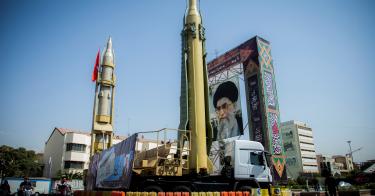I’m baffled that some are themselves baffled by President Trump’s decision last Friday to not “certify” to Congress for the first time in his term the highly controversial 2015 Obama-era nuclear agreement with Iran.
Indeed, the problems with the Joint Comprehensive Plan of Action — the agreement’s official name — between Iran and six world powers (the United States, United Kingdom, France, China, Russia and Germany) are infamous.
While we got a deal with Iran, it was a bad one.
That’s why it’s no surprise that a deeply skeptical Congress passed the Iran Nuclear Agreement Review Act, which requires the president to certify quarterly that Iran is in compliance with the nuclear deal and the pact still supports our national interests.
One of the major concerns, of course, is that the pact only pauses, but doesn’t end, Iran’s nuclear (weapons) program. The original restrictions on its atomic affairs are only now just eight to 13 years away since we’re already a couple years into the agreement.
The nuclear deal is basically just a “can-kicker.”
Despite Tehran’s claims that it isn’t interested in the bomb (yeah, right!), at a minimum, you still need an agreement that doesn’t “sunset,” locking Iran — on paper at least — into being nuke-free forever.
There are also concerns about Iran living up to the agreement.
For decades, Tehran flouted the international Nuclear Nonproliferation Treaty — which says that all nuclear activity must be declared to the International Atomic Energy Agency.
C’mon, would you buy a used nuclear reactor from these guys?
Which brings us to verifying Iran’s compliance with the nuclear agreement: Tehran insists its military sites are off-limits to IAEA inspectors, which undermines any confidence that the world has full visibility on Iran’s remaining nuclear program.
Yes, you read that right: Iran still has a nuclear program — albeit a scaled-down one.
Plus, does anyone remember the Clinton administration’s 1994 Agreed Framework deal that “froze” North Korea’s nuclear program? Pyongyang cheated for years before it was caught early on in President George W. Bush’s first term.
No wonder the White House isn’t comfortable giving a thumbs-up to Iranian performance under the pact.
There are plenty of other reasons for the White House to balk, too, including Iran’s burgeoning ballistic missile program — the Middle East’s biggest; ICBMs are in the works — and Tehran and Pyongyang are apparently “proliferation pals.”
Then there’s Tehran’s state sponsorship of terrorism (Hamas, Hezbollah and the like). And who can overlook its support for the Syrian regime in that horrific civil war?
In other words, outside the nuclear deal, Iran’s international behavior isn’t living up to the spirit of the pact that was supposed to decrease tensions with the Islamic Republic.
This clearly hasn’t been President Nixon going to China in 1972.
Despite the White House’s decision to not certify the agreement, the United States hasn’t busted out of the deal — yet. Team Trump passed the responsibility for addressing the deal’s shortcomings to Congress.
We may see something on that as early as this week.
This decision was also clearly a call to the pact’s other parties to come up with fixes that end — not just slow — Iran’s nuclear program and moderate its incendiary international behavior.
If that happens, then we could possibly be looking at a decent deal.
This piece originally appeared in Boston Herald



